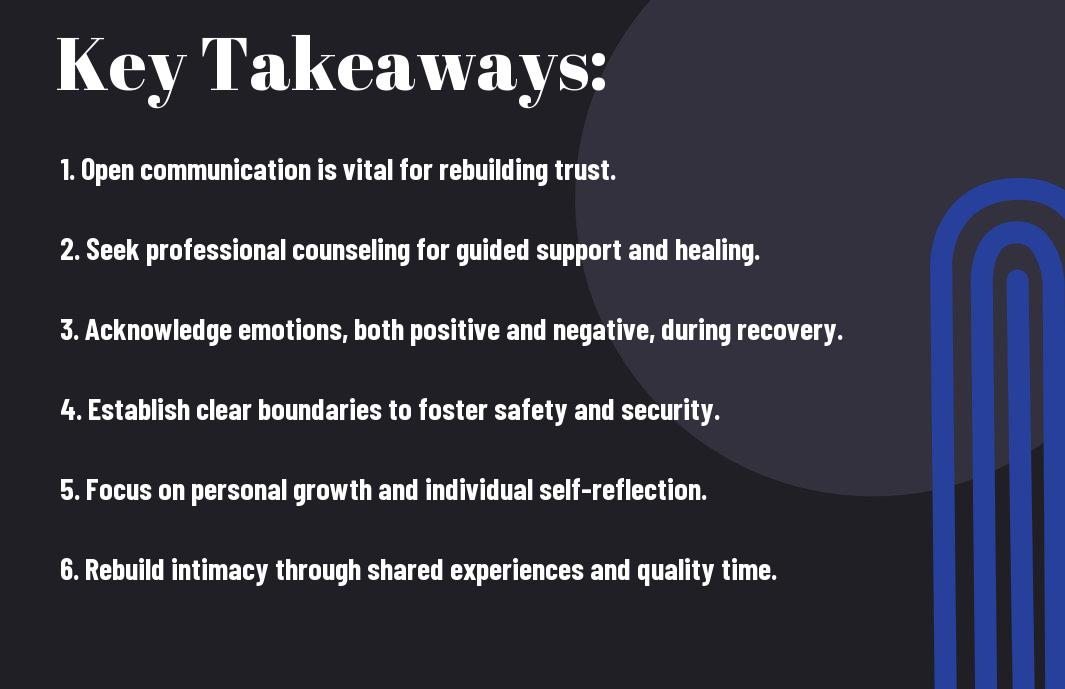Many couples face the devastating impact of infidelity, which can shake the very foundation of your marriage. It’s important to understand that healing is possible and moving forward can lead to a stronger bond. This post will guide you through the painful yet transformative process of rebuilding trust, embracing open communication, and nurturing your emotional well-being. Acknowledging your feelings and seeking support are vital steps toward restoration and a renewed relationship. Let’s explore how you can navigate this challenging journey together.
Key Takeaways:
- Open communication is important for rebuilding trust after infidelity.
- Understanding the underlying issues that led to the infidelity is vital for future prevention.
- Counseling or therapy can provide a safe space for both partners to express their feelings and work through the healing process.
- Both partners should acknowledge their feelings and experiences, as this promotes empathy and understanding.
- Setting boundaries and establishing expectations moving forward can help create a renewed sense of security in the marriage.
- Forgiveness is a process that takes time; both partners should be patient with themselves and each other.
- Focusing on rebuilding intimacy and connection can help strengthen the relationship post-infidelity.

Understanding Infidelity
Your journey towards understanding infidelity begins with recognizing its complexities. Infidelity can devastate relationships, and grasping its layers is important for healing. Engaging in open conversations about feelings and motivations can help you navigate this turbulent landscape, allowing you to address underlying issues and work towards resolution.
Types of Infidelity
Your understanding of infidelity is enhanced by knowing its various forms. Each type carries unique implications for trust and communication within a relationship. Below are common types:
| Emotional Infidelity | Forming a deep, intimate connection with someone outside the marriage. |
| Physical Infidelity | Engaging in sexual relations with someone other than your partner. |
| Online Infidelity | Creating intimate relationships through social media or dating websites. |
| One-night Stand | Engaging in a brief sexual encounter without emotional attachment. |
| Revenge Infidelity | Having an affair to retaliate against a partner’s previous transgressions. |
The understanding of these types can help you recognize the dynamics at play in your own relationship.
Common Causes
Common factors that lead to infidelity often stem from unmet needs, whether emotional, physical, or psychological. It’s crucial to explore these aspects within your marriage for healing.
And, by addressing feelings of neglect, insecurity, or lack of communication, you can foster a healthy dialogue with your partner. Many individuals seek fulfillment outside their relationship due to a strong desire for intimacy or a lasting feeling of dissatisfaction in their marriage. Recognizing these patterns enables you to work on rebuilding trust and understanding within your partnership.

The Impact of Infidelity on Relationships
Even though infidelity can result in devastating emotional fallout, its effects go beyond just the individuals involved. Your relationship may suffer significant turmoil, leading to a loss of intimacy, connection, and the foundation of trust. Understanding these impacts is vital for anyone aiming to heal and rebuild after such a betrayal.
Emotional Consequences
Around the aftermath of infidelity, feelings of betrayal, anger, and confusion often prevail. These emotions can create a heavy weight on your relationship, hampering your ability to communicate effectively. You might find that both you and your partner struggle to process these feelings, making it hard to navigate forward.
Trust and Communication Breakdown
On the communication front, infidelity frequently leads to a significant breakdown of trust. When deception enters your relationship, it can create an environment of fear and suspicion, making it difficult for open dialogue to thrive. You may find yourself questioning your partner’s actions and words, leading to a cycle of accusations and defensiveness.
Also, addressing the impact of infidelity requires a commitment to rebuilding trust and reestablishing healthy communication. Without this effort, misunderstandings can fester, perpetuating a cycle of pain and resentment. Engaging in open discussions about feelings, expectations, and boundaries is key. It allows you to explore solutions together, fostering a sense of security that can help bridge the gap left by betrayal. Ultimately, mutual effort in these areas not only aids in recovery but can also pave the way for a renewed commitment to each other.

Steps to Healing After Infidelity
Unlike the initial shock of discovering infidelity, healing requires deliberate steps to rebuild trust and intimacy. You must be prepared to engage in a process that not only addresses the betrayal but also lays the groundwork for a healthier future in your marriage.
Acknowledgment and Acceptance
The first step in the healing journey is to acknowledge and accept the reality of infidelity. You need to confront the painful emotions that arise from this betrayal and give yourself permission to feel and express them. Embracing this truth is vital for moving forward.
Open Dialogue and Honest Communication
Across the healing journey, open dialogue and honest communication are fundamental components for rebuilding your relationship. You must create a safe environment where both partners can express their feelings, concerns, and desires without fear of judgment. This transparency allows for a deeper understanding of each other’s perspectives, fostering healing as you work through your emotions together.
At this stage, effective communication becomes a lifeline for your relationship. You should focus on openly discussing the infidelity, sharing your feelings, and addressing the underlying issues that contributed to the betrayal. Be prepared to listen actively, allowing your partner to voice their emotions without interruption. This commitment to honesty and vulnerability can help you rebuild trust and create a stronger foundation for your relationship moving forward.
Rebuilding Trust
Once again, rebuilding trust after infidelity requires both time and commitment. It involves open communication where both you and your partner can express feelings, fears, and expectations. By remaining transparent and showing consistent behavior, you can slowly re-establish the solidarity that was shattered. This process may be uncomfortable, but it’s necessary for the foundation of your relationship to be restored.
Establishing Boundaries
Trust is reinforced in a relationship when you establish clear boundaries that both partners agree upon. This means defining what is acceptable in your interactions with others and identifying behaviors that could lead to misunderstandings or temptation. Be open about your feelings and concerns, and make sure you’re both on the same page to avoid future issues.
Creating a Plan for Reconnection
Around healing from infidelity, it is necessary to actively reconnect with your partner. This means taking intentional steps to foster intimacy and understanding. You might need to engage in shared activities that you both enjoy, or dedicate time to open conversations about your feelings and aspirations. Reassessing your relationship goals together can help strengthen your bond.
Considering a plan for reconnection involves highlighting shared experiences that can reignite the spark in your relationship. It’s important to be deliberate about spending quality time together, whether it’s through date nights, meaningful conversations, or emotional check-ins. Additionally, each partner should express their needs and expectations moving forward, as this transparency fosters a deeper understanding. Make sure to celebrate small victories along the way, as they can significantly enhance your emotional connection and trust in each other.
Professional Help and Support
Now, seeking professional help can significantly aid both partners in healing from infidelity. Engaging with a qualified therapist can provide a safe space to express feelings, process emotions, and explore underlying issues that may have contributed to the affair. For practical advice, check out these Practical, Science-Based Steps to Heal from an Affair that can guide you through this challenging time.
Couples Therapy
Above all, couples therapy can foster communication between you and your partner, allowing both to express thoughts and emotions about the infidelity. A therapist trained in this area can help navigate complex feelings, build trust, and re-establish your connection, ensuring that you both feel supported in the process.
Individual Counseling Options
After addressing the impact of infidelity, exploring individual counseling options can be beneficial. This allows each partner to work through their feelings and develop coping strategies tailored to their personal journey. Whether dealing with anger, betrayal, or forgiveness, individualized attention can enhance the healing process.
Plus, individual counseling offers a chance for self-reflection and personal growth. In these sessions, you can explore into your emotions and address any personal issues that may have contributed to the affair. This may include rebuilding your self-esteem and understanding any patterns in your relationships. Your counselor can provide tools to help you develop healthier decision-making skills, ensuring that you move forward positively in your relationship and life.
Moving Forward Together
Not all couples can overcome the challenges posed by infidelity, but those who choose to commit to healing have an opportunity to emerge stronger. You must be willing to rebuild trust and create an even deeper connection. By prioritizing open communication and shared activities, you can foster a supportive environment that encourages growth. Embracing this journey together can lead to a renewed partnership, filled with understanding and love.
Setting New Goals
Together, you can set new goals that will help redefine your relationship and provide a roadmap for your future. Consider what both of you desire from your partnership moving forward, whether it’s enhancing emotional intimacy, creating healthier communication patterns, or spending more quality time together. Establishing these goals will act as milestones, guiding you as you navigate the healing process.
Strengthening the Relationship
Strengthening your relationship after infidelity means actively working on rebuilding trust and fostering deeper connections. Explore new shared activities that can help reignite the spark between you, such as taking classes together or planning regular date nights. By intentionally creating positive experiences, your bond can be fortified, making it easier to overcome past hurt.
Another vital aspect of strengthening your relationship is maintaining open and honest dialogue about your feelings and concerns. You need to discuss not only the trauma from the infidelity but also your individual needs moving forward. Practicing active listening and validating each other’s feelings can help foster a deeper emotional connection. Additionally, addressing potential triggers that may cause anxiety can create a sense of safety in the relationship. Engaging in couples therapy can offer guidance and tools necessary for long-term success. You have the power to redefine what your partnership looks like, and with effort, create an even more fulfilling relationship.
To wrap up
Conclusively, healing from infidelity in your marriage requires open communication, honesty, and patience. You must confront the emotional wounds caused by betrayal and work collaboratively with your partner to rebuild trust. Consider seeking professional help if needed, as a therapist can guide you through the complex feelings and improve your relationship dynamics. Focus on understanding each other’s perspectives, fostering empathy, and rediscovering the foundation of your bond. By prioritizing these steps, you can navigate the path to recovery and emerge stronger together.
FAQ
Q: What are the common signs of infidelity in a marriage?
A: Infidelity can manifest in various ways. Common signs include sudden changes in behavior, such as increased secrecy, a shift in communication patterns, unexplained absences, emotional distance, or a noticeable decline in intimacy. Partners may also experience heightened suspicion or gut feelings that something is amiss. It’s important to approach these signs thoughtfully and communicate with your partner before jumping to conclusions.
Q: How can couples begin the healing process after infidelity?
A: Healing after infidelity is a gradual process that involves open and honest communication. Both partners should express their feelings and concerns, acknowledging the pain and betrayal. Setting aside dedicated time to talk about the relationship can help. Additionally, seeking professional counseling or therapy can be beneficial. This provides a structured environment to process emotions, understand the underlying issues, and establish a plan for rebuilding trust.
Q: Is it possible to rebuild trust after an affair, and how can this be achieved?
A: Yes, rebuilding trust is possible, but it requires time and commitment from both partners. The unfaithful partner must take responsibility for their actions and show genuine remorse. Transparency is key; sharing thoughts and feelings openly can help restore faith in each other. Establishing clear boundaries and consistent behavior will also foster trust over time. Couples may benefit from working together to create a plan for moving forward, which can help guide them in their journey of healing.
Q: What role does forgiveness play in overcoming infidelity?
A: Forgiveness is a vital component in the journey toward healing after infidelity. It allows the betrayed partner to process their hurt and start letting go of resentment. However, forgiveness is a personal choice and should not be rushed. It often involves acknowledging feelings of pain and betrayal before reaching a place of understanding. Couples may find it helpful to express their feelings about the infidelity in a safe environment and gradually work towards forgiveness together.
Q: How do we know if our marriage can survive after infidelity?
A: The ability of a marriage to survive infidelity largely depends on the willingness of both partners to invest in healing and rebuilding the relationship. Factors include the level of remorse shown by the unfaithful partner, the commitment to open communication, and the couples’ ability to address underlying issues. If both individuals are genuinely focused on understanding each other’s perspectives and are dedicated to the healing process, many marriages can potentially emerge stronger after an affair.
